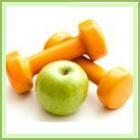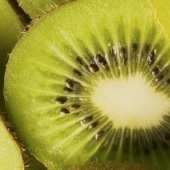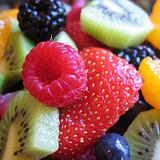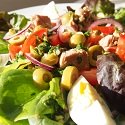Kiwi Nutrition Facts,
Health Benefits of Kiwi Fruit
Everything on kiwi nutrition, nutritional value of kiwi, health benefits of kiwi, calories in kiwi, kiwi nutrients, kiwi benefits
The kiwi fruit originates from China, originally called the Chinese gooseberry, the fruit then made its way to New Zealand, where it got the name, kiwi. It makes for a very good looking addition to any fruit salad.
The fruit is full of vitamin C, more even than an orange, and provides
four times as much fiber as a grapefruit, helping to make you feel
fuller, and therefore ideal as part of your weight loss diet. It is
thought the fiber helps to lower our bad cholesterol and reduce the
incidence of colon cancer. Fat is almost non-existent, they contain no
cholesterol, and only 61 calories per 100g serving.
They also
contain magnesium and potassium, believed to be key to lowering
cholesterol and helping to maintain normal blood pressure.
The
kiwi fruit is full of phytonutrients, helping to protect against
arthritis, reducing the risk of some cancers and cardiovascular
diseases. Given the high quantity of vitamin C, they are also believed
to help boost our immune systems.
When purchasing, kiwis should
be firm and give slightly when pressed. They should last for a week when
refrigerated. Kiwis are great juiced; consider mixing with orange or
grape juice.
Compare kiwi nutrition facts to the other fruits.

Nutritional Value of Kiwi
| Kiwi Nutrition per 100 g (3.5 oz) Refuse: 24% (Skin) Scientific Name: Actinidia deliciosa Common Name: Chinese gooseberry |
||
|---|---|---|
| Proximates: | ||
| Nutrients | Kiwifruit, green, raw | Kiwifruit, gold, raw |
| Water | 83.07 g | 83.22 g |
| Energy | 255 kJ (61 kcal) | 251 kJ (60 kcal) |
| Protein | 1.14 g | 1.23 g |
| Carbohydrates | 14.66 g | 14.23 g |
| Total Fat: | 0.52 g | 0.56 g |
| Fiber | 3 g | 2 g |
| Cholesterol | 0 mg | 0 mg |
| Minerals: | ||
| Calcium, Ca | 3.4 mg (3.4 %) | 20 mg (2%) |
| Iron, Fe | 0.34 mg (2 %) | 0.29 mg (2%) |
| Magnesium, Mg | 17 mg (4 %) | 14 mg (4%) |
| Phosphorus, P | 34 mg (3.4 %) | 29 mg (3%) |
| Potassium, K | 312 mg (7 %) | 316 mg (9%) |
| Sodium, Na | 3 mg (0.1 %) | 3 mg (0%) |
| Zinc, Zn | 0.14 mg (1 %) | 0.10 mg (1%) |
| Copper, Cu | 0.130 mg (7 %) | 0.147 mg (10%) |
| Manganese, Mn | 0.098 mg (5 %) | 0.058 mg (3%) |
| Selenium, Se | 0.2 mcg (0.3 %) | 3.1 mcg (4%) |
| Vitamins: | ||
| Vitamin C | 92.7 mg (154 %) | 105.4 mg (176%) |
| Thiamine (Vit. B1) | 0.027 mg (2 %) | 0.024 mg (2%) |
| Riboflavin (Vit. B2) | 0.025 mg (1.5 %) | 0.046 mg (3%) |
| Niacin (Vit. B3) | 0.341 mg (1.7 %) | 0.28 mg (1%) |
| Pantothenic acid (B5) | 0.183 mg (2 %) | 0.5 mg (5%) |
| Vitamin B6 | 0.063 mg (3 %) | 0.057 mg (3%) |
| Folate (Vit. B9) | 25 mcg (6 %) | 34 mcg (9%) |
| Vitamin B12 | 2.80 mcg (47 %) | - |
| Vitamin A | 87 IU (2 %) | 72 IU (1%) |
| Vitamin E | 1.46 mg (7 %) | 1.49 mg (7%) |
| Vitamin K | 40.3 mcg (50 %) | 5.5 mcg (7%) |
| Percentages are relative to US Recommended Daily Intake (RDI) for adults. | ||
Author: Lana Soko
You Might Also Like:
Like This Page?
|
Share This Page:
|
Search Our Site:

Free E-Book:
We Recommend:
Looking to get your body into great shape? Get the very best results for your efforts and money! Save your valuable time from surfing the internet. These are theBestselling Weight Loss Programs

Programs that work and have thousands of satisfied customers worldwide!

 |




